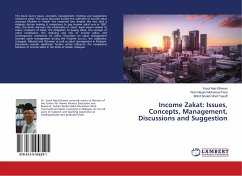
Compliance Behavior of Zakat: A Moderating Effect of Religiosity
Versandkostenfrei!
Versandfertig in 6-10 Tagen
58,99 €
inkl. MwSt.

PAYBACK Punkte
29 °P sammeln!
This book discusses the influence of attitude, subjective norms, perceived behavioral control and moral obligation on intention and the influence of the intention on compliance behavior of income zakat payment. Also, it examines whether Islamic religiosity moderates the relationship between attitude, subjective norms, perceived behavioral control and moral obligation, and intention to comply with income zakat payment. Furthermore, this book suggests that zakat institutions plan, strategize and implement an effective intervention by providing accurate and powerful new information to Muslims who...
This book discusses the influence of attitude, subjective norms, perceived behavioral control and moral obligation on intention and the influence of the intention on compliance behavior of income zakat payment. Also, it examines whether Islamic religiosity moderates the relationship between attitude, subjective norms, perceived behavioral control and moral obligation, and intention to comply with income zakat payment. Furthermore, this book suggests that zakat institutions plan, strategize and implement an effective intervention by providing accurate and powerful new information to Muslims who have fulfilled the conditions of paying income zakat in general and Muslim teachers in particular, which could change their beliefs about the impact of paying zakat. The changed beliefs which are influenced by the new information would lead to improvement in the attitude, perception about behavioral control and moral obligation, as well as Islamic religiosity, which in turn, leads to improvement in the collection of income zakat in the future.












